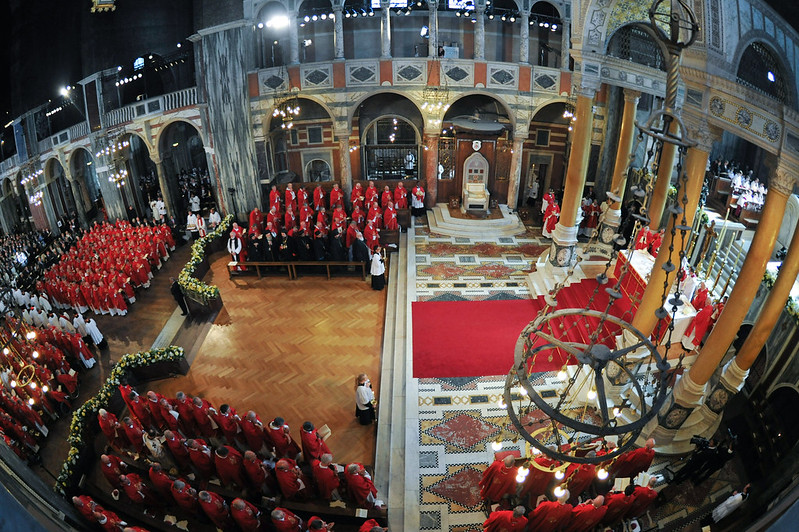The Archbishop of Westminster, Cardinal Vincent Nichols, is to create a Charter for Sacred Music in Westminster Cathedral, in response to a strategic review.
In his response, the cardinal also pleads for funds to help support the music at the cathedral after revealing that Covid-19 has caused income to be slashed by half.
The review follows months of controversy around the choir.
It states: “Cardinal Vincent commissioned our work in the context of some public debate about recent changes in arrangements for producing sacred music.” This is a reference, among other things, to changes to boarding arrangements for choristers, who are now free to go home at weekends.
Cardinal Nichols says in response to the review, published today: “Westminster Cathedral is not a concert hall. Its music department is not a branch of ‘the music industry’.
“Sacred music is an intrinsic part of the liturgy of the Church and is to be sustained and developed according to the living tradition of the Catholic Church. This is the reason for our striving for excellence: that we offer only our best endeavours in praise of God.
“This excellence places sacred music as a treasured part of an enduring culture and a high point of human achievement. I therefore welcome and accept the resolution of the review that I produce a Charter for Sacred Music in Westminster Cathedral, ‘locating it in the mission of the Cathedral’. I will produce this charter in the coming weeks.”
In one recent development, the cathedral’s music administrator, Madeline Smith, stepped down, citing a row over the future of the choir school in her resignation letter.
Cardinal Nichols rejects the review's recommendation that the choristers return to the cathedral on Saturday night, instead of before Mass on Sunday, which would give them fewer than 24 hours at home.
The panel, consisting of Robert Arnott, Leslie Ferrar, Mgr Mark Langham and Andrew Reid, was asked to consider the “steps needed to strengthen the role played by sacred music, as well as the structures and clarity of roles required for the continued development of the contribution of music to the mission of Westminster Cathedral, within the network of relationships between the Cathedral, its Music Department and Westminster Cathedral Choir School.”
In the review, they state: “We believe that first-class sacred music is a very considerable asset in Westminster, akin to or of even higher worth than Bentley’s great building.” Referring to the present pandemic, they say: “We also believe that our recommendations are consistent with achieving a stable financial footing for sacred music, and that they stand on their merits even in this, new context.”
Besides the creation of a foundational charter for sacred music in the mission of the cathedral, the review recommends a multi-year strategy for sacred music, a governance structure and framework outlining responsibilities, accountabilities and inter-relationships between the cathedral, music department, school and diocese with a new committee to coordinate efforts, addressing the urgent and long-term funding needs and addressing the complementary roles of the school and the music department.
Mr Arnott said: “The exceptional music produced by Westminster Cathedral and its celebrated choir places it at the forefront of worldwide Catholic liturgy. The members of the review panel find no reason why Westminster Cathedral should not continue to sustain excellence in sacred music.
“Our recommendations seek to offer both short- and long-term solutions, carefully building on evidence and expert analysis. This undertaking has been made wholly possible because of the autonomy, widely-drawn terms of reference, and freedom of inquiry that we have enjoyed.”
Cardinal Nichols added in his response: “I also wish to thank the families of the young choristers, both present and past, who have made great sacrifices so that their boys could contribute to the sacred music which is such a significant part of the life and liturgy of Westminster Cathedral.
“Without these boys, and their parents and families, there would be no choir. I thank Westminster Cathedral Choir School, its governors and staff, for their tireless effort in maintaining an excellent school which provides the education, boarding and support for the choristers. Without this school there is no choir.”
He also thanks the adult musicians who have, over the years, “brought their expertise to bear to glorify God through music in the Cathedral”.
He continues: “I am confident that by implementing the thrust of these recommendations we will be providing a clarity of structure and a way of co-ordinating the efforts of all involved in the provision of sacred music needed for the years to come, not least because of the enhanced regulatory duties that fall now to all charitable bodies.”
On the question of money, he emphasises that the financial impact of the effects of the pandemic should not be minimised.
The Cathedral provides, in round figures, £500,000 a year in support of the music department of the cathedral. But in the course of this year, cathedral income has decreased by roughly 50 per cent. The funds in the endowment for cathedral music are sufficient for no more than a further eighteen months of such funding. So it is clear that the Review’s call for a significant fundraising effort in support of sacred music in Westminster Cathedral must be heeded.
“I therefore ask all those who profess to be fervent supporters of this precious inheritance of sacred music to become regular contributors to its financial support. It is, unquestionably, time to look ahead in order to ensure that this tradition of sacred music in Westminster Cathedral not only survives this financially turbulent period but can be put onto a firm footing for years to come.”
Rejecting the proposal to shorten the time the boys spend at home so they return to the cathedral on Saturday night, the cardinal says: “The proposal removes the ‘day of rest’ each week that young voices need. It involves the choristers singing seven days a week. In the traditions of the cathedral choir, there has consistently been a day of rest from singing. It has to be maintained.”
He also criticises the panel for proposing this timetable on the basis of musical opinion: “In my judgement insufficient weight has been given to the parental and educational points of view which stress the importance of family time in the life of young boys. No consultation took place with the parents or the school in the fashioning of this proposed timetable. The evidence is that the school has had a happier and more relaxed atmosphere since these changes to boarding arrangements were made. Current parents express their satisfaction.”
However, other changes to when the boys sing that the cardinal is making, means they will sing at seven services over six days of the week, as they did before the changes to boarding arrangements. There will also be more time for rehearsals.
Previously, before seven-day boarding was removed, the boys rested from singing from Tuesday evening until Thursday morning. Now the rest period will now be from Friday evening until Sunday morning.
The Society for the Protection of Westminster Cathedral Choir, which opposes changes to boarding arrangements, criticised as “extremely concerning” some aspects of the report, and accused it of “over-bureaucratising the provision of music” at the Cathedral. “What has brought the famous Cathedral Choir to its knees is not primarily the absence of such bureaucratic processes, but a fundamental lack of transparency in the decision making within the school and the diocese concerning changes to the choir,” it said in a statement.
It welcomed moves that will see the choristers sing at two additional services, bringing the number to seven services a week across six days, as happened before the changes to boarding arrangements. Before seven-day boarding was removed, the boys rested from singing from Tuesday evening until Thursday morning. Now the rest period will now be from Friday evening until Sunday morning.



 Loading ...
Loading ...